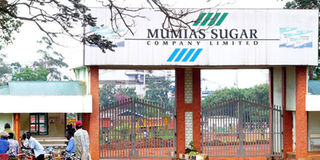Mumias freezes growth plans

PHOTO | FILE Stiff competition and drought have hit Mumias Sugar hard, prompting the firm to issue a profit warning.
What you need to know:
- Initiative to move to Tana Delta and set up a Sh34 billion plant to await county government as firm issues profit warning
Mumias Sugar will put on ice plans to construct a Sh33.6 billion factory in Tana Delta. The project will await the approval of the county government. This could negatively affect the miller, which has already issued a profit warning.
The company’s chief executive, Mr Peter Kebati, last week said the joint venture with the Tana/Athi River Authority (Tarda) would be put on hold until the regional government, which begins working today, and the newly gazetted National Land Commission approves the project.
“We want to wait until the land commission demarcates the local area to ensure that there are no problems. We also want to work very closely with the county government,” he said.
The project was first conceptualised six years ago but is yet to take off. Last year, Mumias said it would raise the needed funds from shareholders and syndicated loans.
Delays in the Tana factory could hurt Mumias’ bid to diversify its sugar cane variety amid erratic production in traditional growing areas and cutthroat competition from rivals.
Mr Kebati spoke during a press briefing on the company’s financial results for the six months ending December 2012. The miller suffered Sh1 billion loss for the period and issued a profit warning that its earnings for the year-to-June 2013 would fall by over 25 per cent.
Mumias has attributed the dismal performance to drought experienced in 2011, which depressed sugar cane yields while lowering the quality of the raw material.
Further, the company said it has experienced aggressive sugar cane poaching from rival millers in western Kenya.
The company cited alleged sugar dumping in Kenya by unscrupulous traders from Tanzania and Uganda as another reason for its poor performance. Last year, the East African Community (EAC) gave traders in the two countries the leeway to import sugar into the region duty-free as they battled a shortage. However, there are fears that much of this product has been dumped locally.
“EAC permitted Uganda and Tanzania to import duty free sugar from non-Comesa countries, which flooded the regional market resulting in depressed prices,” the company said.
According to Mumias, the price per tonne of sugar fell to Sh74,000 in 2012 from Sh106,000 in 2011. Simultaneously, the retail cost of the product fell to Sh120 per kilogramme from a peak of Sh200 for the same quantity.
Mumias’ other diversification efforts also fell flat during the period. Revenue from the sale of electricity was reported at Sh162 million, an increase of 5.2 per cent from the previous year. Ethanol and water brought in Sh50 million and Sh10 million respectively.
“The factories were operating below capacity due to technical issues but we have resolved and hope to hit 70 per cent capacity in all our production plants,” said Mr Kebati.
The Tarda project is expected to solve some of these challenges by giving Mumias access to faster maturing sugar cane varieties with increased sucrose content and freeing it from dependency on rain-fed crops.




